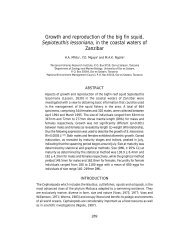gpa_east_africa_case.. - GRID Africa GeoPortal - UNEP
gpa_east_africa_case.. - GRID Africa GeoPortal - UNEP
gpa_east_africa_case.. - GRID Africa GeoPortal - UNEP
You also want an ePaper? Increase the reach of your titles
YUMPU automatically turns print PDFs into web optimized ePapers that Google loves.
• Degradation of coastal and marine water quality due to the release of untreated sewage,industrial waste and agrochemicals. Eutrophication due to the release of inorganicnutrients (phosphate, nitrate and ammonia) into coastal waters from domestic sewagearound Zanzibar has been identified as one of the main cause of the decreased cover ofcoral-reef-building algae (Bjork et al., 1995).• Destruction of coastal habitats from disposal of untreated domestic wastes. Domesticsolid wastes, such as organic wastes, paper and plastics, are collected by municipalservices in only some parts of the larger coastal towns. Given the limited coverage of thecollection system, the bulk of wastes are not disposed in dumping sites and pile up inresidential and industrial areas near the coast posing a hazard to public health and thecoastal environment. In Mombasa only 53% of the 103, 000 tons of annual solid wasteproduction is collected. The dumping of domestic waste on mangrove forests aroundMakupa Creek and in Lamu has been reported (Linden and Lundin, 1997). Also inZanzibar, domestic solid wastes is being dumped on Maruhubi mangroves (DorschConsult and Ministry of Water, Construction, Energy, Lands, and Environment, 1992).ResponsesThe countries of the Western Indian Ocean are either parties to a number of regionalinitiatives or actively participate in the activities promoted under regional programmes,including:• Intergovernmental Oceanographic Commission’s Regional Committee for Co-operativeInvestigations in the North and Central Western Indian Ocean (IOCINCWIO)• Eastern <strong>Africa</strong>n and the Islands States Integrated Coastal Management Process• Indian Ocean Commission (COI) for the island states• Convention for the Protection, Management and Development of the Marine and CoastalEnvironment of the East <strong>Africa</strong>n Region and related protocols (The Nairobi Convention).In recognition of the strategic importance of water supply and sanitation services, internationaland regional programmes have drawn attention to the identification of their significance, theseverity of the impacts of poor management and the need to formulate and implementsustainable strategies. Water and related issues is the focus of Chapter 18 of Agenda 21. Keyissues of concern include the role of water and sanitation in promoting sustainable urbansettlement planning, particularly for access to safe drinking water, provision of affordablesanitation infrastructure, participation and private sector initiatives in the design and operationof service delivery systems and capacity-building for resource management and enforcement.The management of the marine environment, including the maritime zones outside thenational jurisdiction of coastal states, has long been a major concern of the internationalcommunity. The first UN Conference on the Law of the Sea, held in Geneva in 1958, broughttogether several UN agencies, intergovernmental organisations and individual States for thepurpose of developing strategies to protect the marine environment. The Regional SeaProgramme of <strong>UNEP</strong>, initiated in 1974, is a major outcome of this effort aiming to provide acomprehensive framework for regional co-operation in the Seas and Oceans.In 1980 the Eastern <strong>Africa</strong>n region became part of the <strong>UNEP</strong>’s Regional Sea Programme.The Eastern <strong>Africa</strong> Action Plan, the Nairobi Convention for the Protection, Development andManagement of the marine environment and related Protocols were developed in the early1980s under the auspices of <strong>UNEP</strong>’s Regional Sea Programme. The Nairobi Convention andits related Protocols were adopted in 1985 dealing with the prevention and control of marinepollution from ships, pollution caused by dumping of wastes from land-based sources,pollution from seabed activities and air borne pollution.Several responses have been initiated to develop a framework for regional co-operationdirected to the protection and management of coastal and marine resources, particularly toFinal Draft Report – Cost Benefit Case StudiesGPA Strategic Action Plan on Sewage, October, 200066


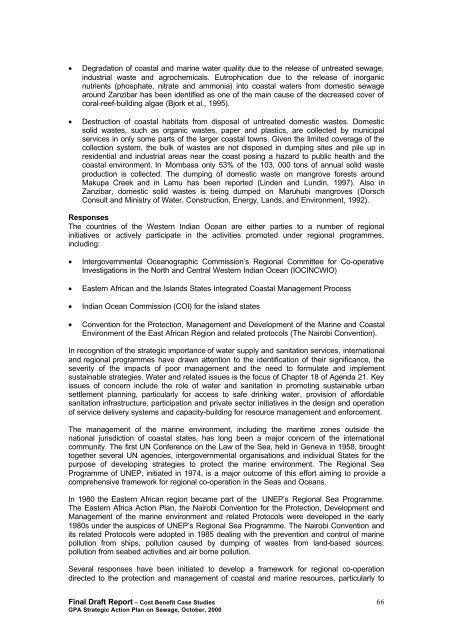
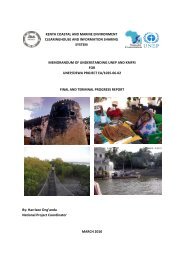
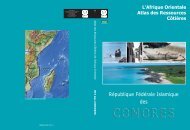
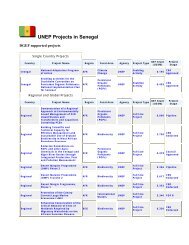

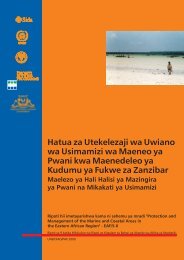
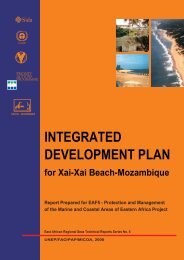
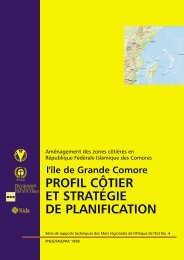
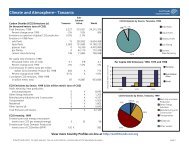
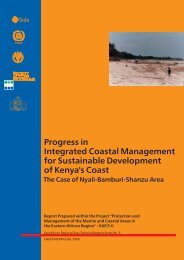
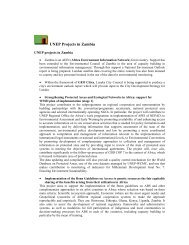
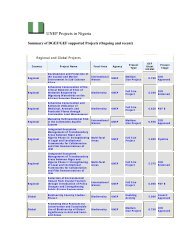
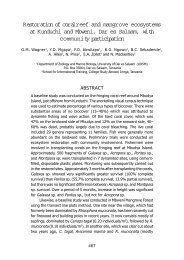
![Please Click to download [English] - GRID Africa GeoPortal - UNEP](https://img.yumpu.com/30633391/1/184x260/please-click-to-download-english-grid-africa-geoportal-unep.jpg?quality=85)
